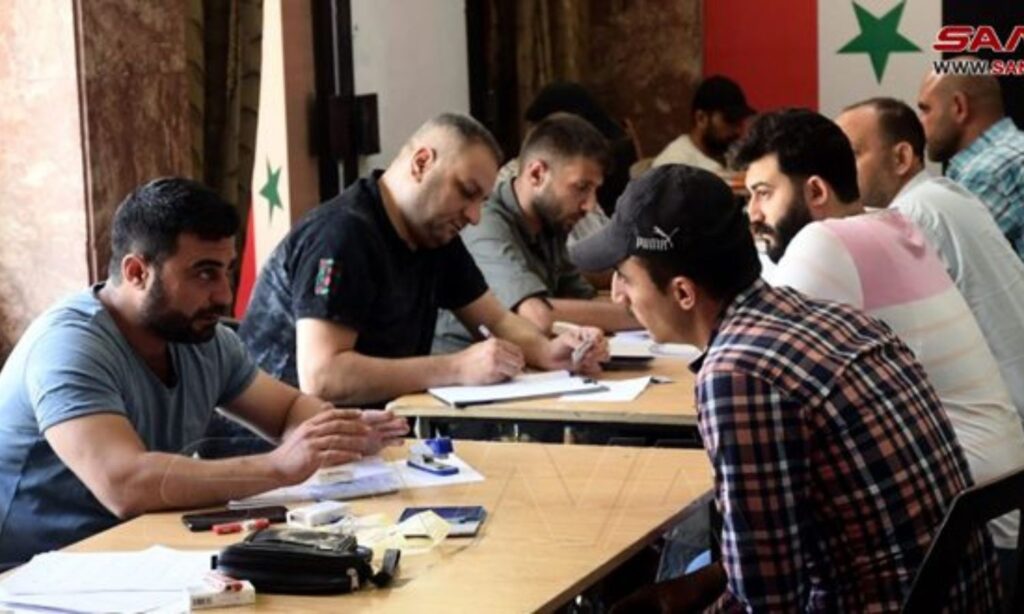A new security settlement is underway in the Quneitra governorate for the residents of Quneitra and the western countryside of Damascus, according to a report by the local Al-Watan newspaper on Wednesday, December 6, as reported by Rif Dimashq governorate via Facebook.
This settlement is for those who have failed to fulfill their mandatory military service or those wanted for reserve service in order to drop the charges of service evasion and join the relevant authority. Their names will be removed from the security lists, and the settlement center is located in the Cultural Center in the city of Al-Baath in the Quneitra governorate.
The settlement includes those who have deserted from military service or the police force, under the condition that they are granted a leave order for one month before joining their units and their names are removed from the lists.
It also includes those who are referred to as “armed individuals,” and their situations will be settled after the surrender of their weapons. If they carry arms again, their names will be removed from the settlement list.
The settlement will cover the areas of Beit Jinn and its countryside from December 10th to the 13th of the current month and in the Quneitra governorate and its countryside on the 14th of the same month. However, the settlement does not include lawsuits filed before the judiciary and the decisions issued by it.
Settlements are “fake rewards”
The Syrian regime is trying to promote the settlement operations as a successful solution that leads to a return to normal life.
Yazan, 29, who lives in Quneitra and preferred to withhold his name, explained to Enab Baladi that the regime does not abide by these settlements. He went through several settlements in the past, and later, when he applied for a passport, he was summoned to multiple security branches despite his commitment to stay at home.
The young man added that he did not receive a settlement or a passport until he paid a sum of money in US dollars.
These settlements do not provide a “lifeline” for Syrian citizens in the regime-held areas. The Syrian Network for Human Rights (SNHR) documented, in August of last year, the detention of a displaced young man residing in the town of Atarib in western Aleppo countryside, one month after he made a security settlement to return to his original place of residence.
“These are Assad’s rewards, and he is the one benefiting from them,” says Qusay (28 years old). He believes that these decisions are futile except for obtaining a passport and leaving the country with no intent to return.
He added that the settlement terms include a return to normal life, but everyone knows that the situation in Syria is no longer normal economically and security-wise. He also emphasized that one cannot rely on or trust these settlements.
Bassam, 32, a former Free Syrian Army fighter in Quneitra, explained to Enab Baladi that after the regime’s control of the area, local fighters were faced with two choices: either deportation or reconciliation.
The young man underwent several settlements but is still wanted. He considers these settlements to have other unclear purposes that are not announced publicly. Some individuals may return to service after losing hope in the situation.
He added that the regime is trying to place the youth in the area under its banner in any form, whether through settlements or otherwise.
“Manipulation policy”
Dissident Colonel Nabil al-Dandal explained to Enab Baladi that the Syrian regime deals with this issue in a manipulative way through these settlements, claiming that it aims to clear the youth’s records. However, what we observe is that those whose status is settled are those who join or are appointed by the regime and work under its banner, nothing more.
Regarding the return to normal life as mentioned in the settlement terms, al-Dandal said that if Bashar al-Assad truly wanted that, he would have formulated a legal action plan for its implementation. However, he seeks to gain loyalty for himself.
Al-Dandal also believes that the regime’s “terrorist” policy is still followed even in the settlements, as evidenced by the cases detained by the regime despite undergoing settlement.
This is not the first settlement in the region. In mid-January last year, the Syrian regime conducted a similar security settlement in the Quneitra governorate with the same terms and details mentioned above.

